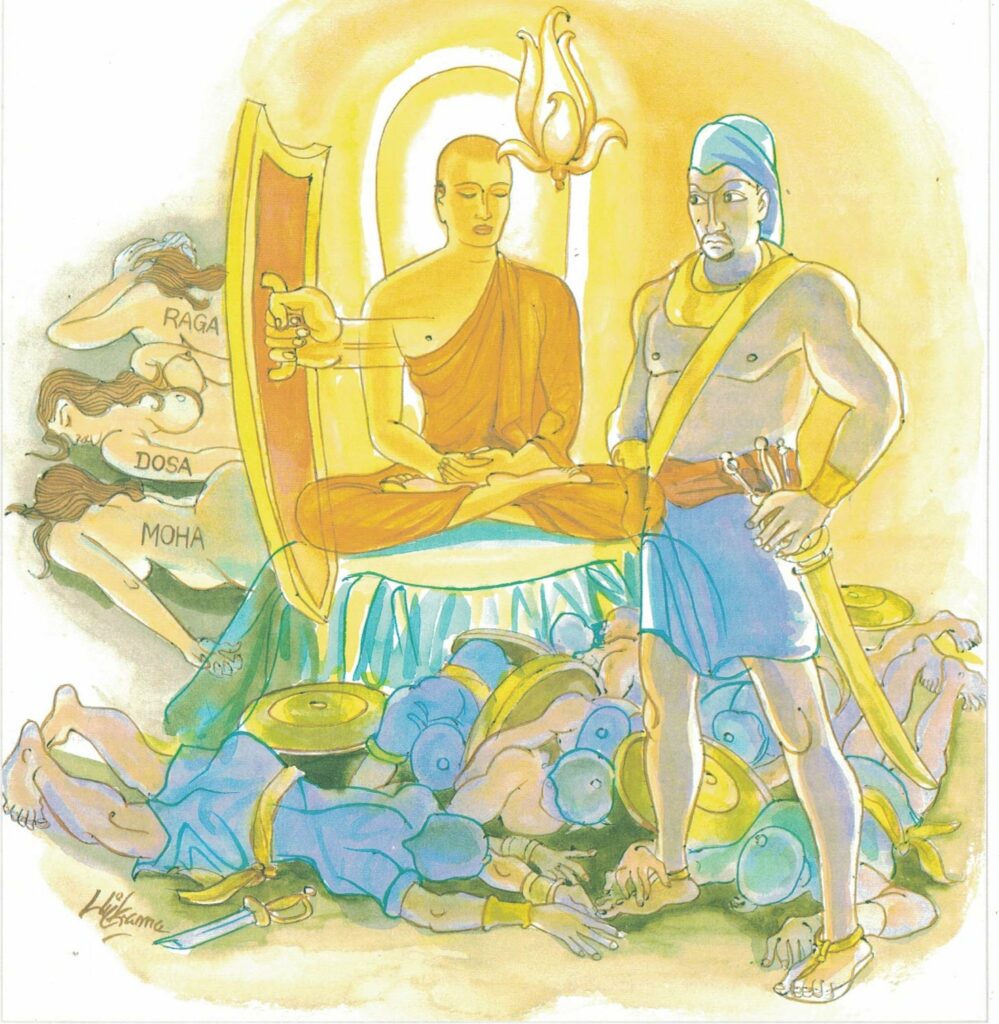Pali text, illustration and English translation of Dhammapada verse 102-103:
yo ce gāthāsataṃ bhāse anatthapadasaṃhitaṃ |
ekaṃ dhammapadaṃ seyyā yaṃ sutvā upasammati || 102 ||
yo sahassaṃ sahassena saṅgāme mānuse jine |
ekañca jeyyam’attānaṃ sa ve saṅgāmajuttamo || 103 ||
102. Though one a hundred verses chant composed of meaningless lines, better the single Dhamma-line one hears, then comes to calm.
103. Though thousand times a thousand in battle one may conquer, yet should one conquer just oneself one is the greatest conqueror.


The Story of Nun Kuṇḍalakesī
While residing at the Jetavana Monastery, the Buddha spoke these verses with reference to Nun Kuṇḍalakesī.
A rich merchant of Rājagaha had an only daughter who was about sixteen years of age, and she was exceedingly beautiful and fair to see. Her mother and father lodged her on the topmost floor of a seven-storied palace in an apartment of royal splendour, and gave her only a single slave-woman to wait upon her. Now one day a young man of station was caught in the act of robbery. They bound his hands behind his back and led him to the place of execution, scourging him with lashes at every cross-road. The merchant’s daughter heard the shouts of the crowd, said to herself, “What is that?” looked down from the top of the palace, and saw him. Straightaway she fell in love with him. So great, in fact, was her longing for him that she took to her bed and refused to eat. Her mother asked her, “What does this mean, my dear daughter?” If I can have that young man who was caught in the act of committing robbery and who was led through the streets, life will be worth living; if not, life is not worth living; I shall die here and now.” The mother, unable to pacify her daughter, told the father;but the father likewise was unable to pacify his daughter. “What is to be done?” thought he. He sent a thousand pieces of money to the king’s officer who had captured the robber and who was accompanying him to the place of execution, saying, “Take this money and send the robber to me.” “Very well!” said the king’s officer. He took the money, released the robber, had another man put to death, and sent word to the king, “The robber has been executed, your majesty.”
The merchant gave his daughter in marriage to the robber. She resolved to win favour of her husband; and from that time on, adorned with all her adornments, she prepared her husband’s meals with her own hand. After a few days the robber thought to himself, “When can I kill this woman, take her jewels and sell them, and so be able to take my meals in a certain tavern? This is the way!” He took to his bed and refused to eat. She came to him and asked, “Are you in pain?” “Not at all, wife.” “Then perhaps my mother and father are angry with you?” “They are not angry with me, wife.” “What is the matter, then?” “Wife, that day when I was bound and led through the streets, I saved my life by vowing and offering to the deity that lives on Robbers’ Cliff; likewise it was through his supernatural power that I gained you for my wife. I was wondering how I could fulfill my vow of an offering to the deity.” “Husband, do not worry; I will see to the offering; tell me what is needed.” “Rich riceporridge, flavoured with honey; and the five kinds of flowers, including the lājā flower.” “Very well, husband, I will make ready the offering.” Having prepared the whole offering, she said to her husband, “Come, husband, let us go”. “Very well, wife; let your kinsmen remain behind; put on your costly garments and adorn yourself with your precious jewels, and we will go gaily, laughing and enjoying ourselves.” She did as she was told. But when they reached their destination, he said to her, I have no use for the offering; I deceived you in bringing you here with an offering.” “Then why did you bring me here, husband?” “To kill you, seize your jewels, and escape.” Terrified with the fear of death, she said to him, “Husband, both my jewels and my person belong to you; why do you speak thus?” Over and over again she pleaded with him, “Do not do this;” but his only reply was, I will kill you.” “After all, what will you gain by killing me? Take these jewels and spare my life.”
She thought to herself, “Oh, what a wicked deed is this! However, wisdom was not made to be cooked and eaten, but rather to make men look before they leap. I shall find a way of dealing with him.” And she said to him, “Husband, when they caught you in the act of committing robbery and led you through the streets, I told my mother and father, and they spent a thousand pieces of money in ransoming you, and they gave you a place in their house, and from that time on I have been your benefactress; today do me the favour of letting me pay obeisance to you.” “Very well, wife,” said he, granted her the favour of paying obeisance to him, and then took his stand near the edge of the cliff. She walked around him three times, keeping him on her right hand, and paid obeisance to him in the four places. Then she said to him, “Husband, this is the last time I shall see you. Henceforth you will see me no more, neither shall I see you any more.” And she embraced him both before and behind. Then, remaining behind him, as he stood off his guard near the edge of the cliff, she put one hand to his shoulder and the other to the small of his back, and flung him over the cliff. Thus was the robber hurled into the abyss of the mountain, and dashed to pieces when he reached the bottom. Having thrown the robber over the cliff, she came to a certain hermitage of nuns. She reverently bowed and said, “Sister, receive me into your order as a nun.” So they received her as a nun.
When she had mastered the thousand articles of faith, they said to her, “You have acquired proficiency; now go throughout the length and breadth of Jambudīpa and look for some one able to match question and answer with you.” So, placing a branch of rose-apple in her hands, they dismissed her with these words, “Go forth, sister; if any one who is a layman is able to match question and answer with you, become his slave; if any monk, enter his Sangha as a nun.” No one was able to match question and answer with her; in fact, such a reputation did she acquire that whenever men heard the announcement, “Here comes the ‘Nun of the Rose-Apple,’” they would run away.
Before entering a town or village for alms, she would scrape a pile of sand together before the village gate and there plant her rose-apple branch. Then she would issue her challenge, “Let him that is able to match question and answer with me trample this rose-apple branch under his feet.” So saying, she would enter the village. No one dared to pass beyond that spot. When one branch withered, she would procure a fresh one. Travelling about in this way, she arrived at Sāvatthi, planted the branch before the city gate, issued her challenge in the usual way, and went in to seek alms. A number of young boys gathered about the branch and waited to see what would happen. Then the Venerable Sāriputta said, “Go ahead, boys, trample that branch under your feet.”
When the nun returned, she asked, “Venerable, did you tell them to trample my branch under their feet?” “Yes, sister.” “Well then, match question and answer with me.” “Very well, I will do so.”
The nun said to the Venerable, “Venerable, I wish to ask you a question.” “Ask it, sister.” So she asked him the thousand articles of faith. Every question the nun asked, the Venerable answered correctly. Then he said to her, “I will ask you just one; will you answer me?” “Ask your question, Venerable.” Then the Venerable asked her, “What is one?” She said to herself, “This is a question I should be able to answer,” but not knowing the answer, she inquired of the Venerable, “What is it, Venerable?” “This is the Buddha’s question, sister.” “Tell me also the answer, Venerable.” “If you will enter our Sangha, I will tell you the answer.” “Very well, admit me to the Sangha.” The Venerable sent word to the nuns and had her admitted. After being admitted to the Sangha, she made it her full profession, took the name Kuṇḍalakesī, and after a few days became an arahat endowed with the supernatural faculties.
Explanatory Translation (Verse 102)
yo ca anatthapadasaṃhitā gāthā sataṃ bhāse
yaṃ sutvā upasammati ekaṃ dhammapadaṃ seyyo
yo ca: if someone; anatthapadasaṃhitā: full of meaningless expressions; gāthā sataṃ [sata]: a hundred verses; bhāse: were to recite; yaṃ sutvā: if someone listening; upasammati. a person is pacified; ekaṃ: even one; dhammapadaṃ [dhammapada]: Dhamma word; seyyo [seyya]: is noble.
One may recite hundreds of verses replete with meaningless expressions. If one recites one line of verse pregnant with wisdom, which is pacifying, it will be more valuable and nobler.
Explanatory Translation (Verse 103)
yo saṅgāme sahassena sahassaṃ mānuse jine,
ca ekaṃ attānaṃ jeyya sa ve saṅgāmajuttamo.
yo: if someone; saṅgāme: in battle; sahassena sahassaṃ [sahassa]: thousands of thousands (million); mānuse: men; jine: were to conquer; ca ekaṃ attānaṃ [attāna]: if one’s own self (which is just one); jeyya: were to conquer; so: he; ve: truly; saṅgāmajuttamo [saṅgāmajuttama]: is the greatest conqueror of battles.
One may conquer a thousand men in a thousand battles. But the person who conquers just one person, which is one’s own self, is the greatest conqueror.
Commentary and exegetical material (Verse 102-103)
attānaṃ: one’s own self. In this stanza what is established is the supreme victory of the person who conquers himself. The individual who conquers himself, conquers just one individual–one’s self. But this victory is greater than conquering tens of thousands in a battle. The implication is, defeating thousands in battle is relatively easier than conquering just one’s own ignorance.